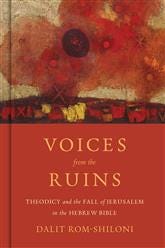Dalit Rom-Shiloni.
Voices from the Ruins: Theodicy and the Fall of Jerusalem in the Hebrew Bible.
Grand Rapids: Eerdmans, 2021.
Review by Dr. Jill Firth
In Voices from the Ruins, Dalit Rom-Shiloni, associate professor of Hebrew Bible at Tel Aviv University, uses the “prism” of theodicy to develop a “theological map” of discourse in the Hebrew Bible about the fall of Jerusalem to the Babylonians in the sixth century BC.
Part I of the book introduces the topic and outlines the methodology. Chapter 1 addresses the “trilemma” of suffering, God’s power, and God’s goodness, and notes three typical “tones” or “types of engagement”: justification of God’s love and goodness in the face of suffering, expressions of doubt of God’s love and goodness, and protest against suffering. These responses are aspects of “theodical discourse,” which is not limited to justification, but allows room for doubt and protest. Rom-Shiloni argues that justification of God must let go of either God’s goodness or God’s power, whereas protest seeks to hold all three together (39).
Chapter 2 introduces “Tanakh theology,” a response to the Christian discipline of Biblical Theology, which reads the Hebrew Bible in association with the New Testament, and to Jewish scholarship that may interpret the Hebrew Bible with reference to second Temple, rabbinic, and later Jewish sources. Tanakh theology seeks to read a text on its own terms, in its own timeframe. It is a descriptive, rather than a systematic theology. Rom-Shiloni focuses on what the sources say about God, “the talk to and about God” (61), in the sources relating to the fall of Jerusalem. She follows a literary approach, focusing not on authorship nor the time of writing, but on the scenario of the fall of Jerusalem, and the speaking personae heard in the relevant texts.
In Kings, Jeremiah, Ezekiel, Lamentations, and seventeen Psalms, Rom-Shiloni finds God-talk to be multi-vocal, with diverse ideas, the topic of Chapter 3. Within the diversity, she identifies key themes of God as king, warrior, and judge. Part II includes chapters on God as king, warrior, and judge, as well as God as the enemy, and describes and analyses the responses to disaster within the selected texts.
The reading is trauma informed, with attention to skepticism, doubt, and protest. These biblical books show crises relevant to trauma studies, including death, destruction, forced migration, loss of land, and assault on national and personal identity. Modern theories of trauma response can be tested in light of these ancient documents as well as in light of modern tragedies. Some theories suggest a linear progression of responses, while the texts suggests that protest, doubt, and justification can occur in the same timeframe. Rom-Shiloni cites the Sermons from the Years of Rage of Rabbi Kalonymus Kalman Shapira, the Piaseczno Rebbe, from the Warsaw Ghetto in 1939–1942. In this short timeframe, justification and protest are expressed by the Rebbe, suggesting that initial reactions in the fall of Jerusalem may also have been complex.
The conclusion (chapter 13) suggests that the voices of protest continue to struggle with the trilemma, while the voices seeking to justify God take three typical paths:
1. Giving up one pole of the trilemma (such as God’s power, or his goodness)
2. Blaming the people
3. Focusing on the past goodness of God or on future hope, rather than present suffering.
Many will be interested in Rom-Shiloni’s methodological reflections, and insights on the development of Jewish theology. Some will wish to interact further with Rom-Shiloni’s proposal of dialogical theodicy, which she develops in response to earlier conversations on a center for Old Testament theology, tradition history, and “multilayered pluralism,” or to respond to her analysis of the voices and their significance.
Voices from the Ruins will be indispensable conversation partner on the books of Kings, Jeremiah, Ezekiel, Lamentations, and Psalms, and will make a lasting contribution to discussions on theodicy and trauma. I look forward to using the book in my classes.
Jill Firth is Lecturer in Hebrew and Old Testament at Ridley College in Melbourne. She is writing a commentary on Jeremiah for The Bible in God’s World.




